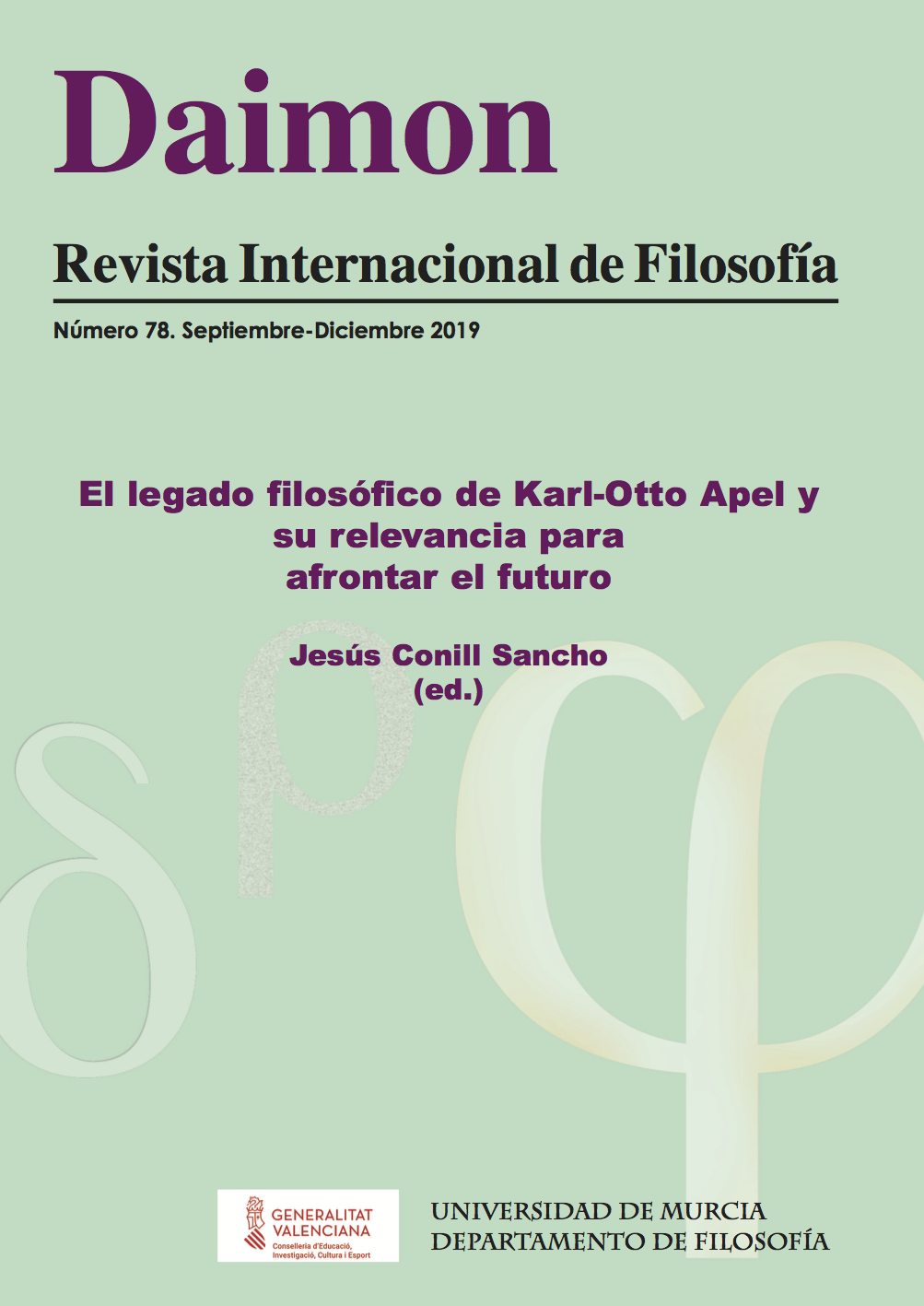The hermeneutic situation from a gnoseo-anthropological point of view. A dialogue of K.O. Apel with and against M. Heidegger.
Abstract
When it comes to describe the ingredients of the hermeneutic situation from which reality is understood and interpreted, it is possible to emphasize some of them or others. Whereas the traditional interpretation of Heidegger's hermeneutic proposal has highlighted the previous way of seeing (Vorsicht), the community language (Vorgriff) or even the things themselves subject of interpretation (Vorhabe) are emphasized in the hermeneutic model of Apel's anthropology of knowledge. The main aim of this paper is to compare and evaluate both proposals, showing the advantages of the gnoseo-anthropological transformation of the hermeneutic situation within the contemporary philosophical framework.
Downloads
-
Abstract663
-
pdf (Español (España))461
References
Apel, K.-O. (1955c), “Die beiden Phasen der Phänomenologie in ihrer Auswirkung auf das philoso¬phische Vorverstädnis von Sprache und Dichtung in der Gegenwart”, Jahrbuch für Ästhetik und allgemeine Kunstwissenschaft, III, 54-76.
Apel, K.-O. (1958a), “Technognomie - eine erkenntnisanthropologische Kategorie”, en: G. Funke (Hg.): Konkrete Vernunft, Festschrift für E. Rothacker, Bonn, 61-79.
Apel, K.-O. (1959a), “Der philosophische Wahrheitsbegriff einer inhaltlich orientierten Sprachwissen¬schaft”, en H. Gipper (ed.): Sprache – Schlüssel zur Welt, Festschrift für L. Weisgerber. Düsseldorf, 11-38.
Apel, K.-O. (1960a), “Sprache und Ordnung”, en Akten des 6. Deutschen Kongresses für Philosophie. München, 200-25.
Apel, K.-O. (1962c), “Reflexion und materielle Praxis: zur erkenntnisanthropologischen Begründung der Dialektik zwischen Hegel und Marx”, Hegel Studien, 1, 151-66.
Apel, K.-O. (1963b), “Das Leibapriori der Erkenntnis. Eine Erkenntnisanthropologische Betrachtung im Anschluss an Leibnizens Monadenlehre”, en Arch. für Philosophie, Bd. 12, 152-72. (Traducción castellana: “El apriori corporal del conocimiento. Una consideración gnoseo-antropológica en conexión con la doctrina de las mónadas de Leibniz”, Ética y Discurso. La revista científica de la Red Internacional de Ética del Discurso 3, 1 (2018) 141-68).
Apel, K.-O. (1965a), “Die Entfaltung der «sprachanalytischen» Philosophie und das Problem der «Geisteswissenschaften»” Philosophisches Jahrbuch, 72, 239-89.
Apel, K.-O. (1968c), “Szientistik, Hermeneutik, Ideologiekritik: Entwurf einer Wissenschaftlehre in erkenntnisanthropologischer Sicht”, Wiener Jahrbuch für Philosophie, I, 15-45.
Apel, K.-O. (1970a), “Szientismus oder transzendentale Hermeneutik? Zur Frage nach dem Subjekt der Zeicheninterpretation in der Semiotik des Pragmatismus, en R. Bubner et al. (ed.): Hermeneutik und Dialektik, Festschrift für H.-G. Gadamer, I. Tübingen, 105-45.
Apel, K.-O. (1970e), “Sprache als Thema und Medium der transzendentalen Reflexion”, Man and World, III, nº 4, 323-37 (recopilado en 1973a II: 311-29).
Apel, K.-O. (1972e), “Einleitung: Transformation der Philosophie”, en 1973a I: 9-72.
Apel, K.-O. (1973a), Transformation der Philosophie, 2 Bd. (Bd. I: „Sprachanalytik, Semiotik, Hermeneutik“; Bd. II: „Das Apriori der Kommunikationsgemeinschaft“). Frankfurt: Suhrkamp, 1973. (Traducción castellana: La transfor¬mación de la filosofía, 2 vols. Madrid: Taurus, 1985).
Bengoa, J. (1992), De Heidegger a Habermas: hermenéutica y fundamentación última en la filosofía contemporánea. Barcelona: Herder.
Bleicher, J. (1987), “Apel: Critical Hermeneutics in the Form of an Anthropology of Knowledge”, en Contemporary Hermeneutics. Hermeneutics as Method, Philosophy and Critique. Routledge and Kegan Paul, 146-51.
Centeno, A. (2012), La antropología del conocimiento en el pensamiento de Karl-Otto Apel. Tesis doctoral publicada en el Repositorio Institucional de la Universidad de Granada DIGIBUG.
Conill, J. (1991), “Antropología del conocimiento”, en El enigma del animal fantástico. Madrid: Tecnos, 297-310.
Conill, J. (1994), “Hermenéutica antropológica de la razón experiencial”, en D. Blanco et al. (ed.): Discurso y realidad. En debate con K.-O. Apel. Madrid: Trotta, 131-43.
Conill, J. (2015), “El Vorhabe heideggeriano y la hermenéutica trascendental”, Diálogo Filosófico, 91, 39-56.
Cortina, A. (1985), “La hermenéutica crítica en Apel y Habermas”, Estudios Filosóficos, 95, 83-114.
Gómez Delgado, J.M. (2015), La realidad del sentido. Comares: Granada, 2015.
Heidegger, M. (1923), Ontología. Hermenéutica de la facticidad. Madrid: Alianza, 1999.
Heidegger, M. (1927), Sein und Zeit, en F. W. von Herrmann (ed.): Gesamtausgabe, vol. 2. (Traducción castellana: Ser y Tiempo. Madrid: Trotta, 2012).
Lafont, C. (1993), La razón como lenguaje. Una revisión del 'giro lingüístico' en la filosofía del lenguaje alemana. Madrid: Visor.
Recas, J. (2006), Hacia una hermenéutica crítica. Gadamer, Habermas, Apel, Vattimo, Rorty, Derrida y Ricoeur. Madrid: Biblioteca Nueva.
Smilg, N. (2000), “Razón, verdad y sentido. La presencia del pensamiento de M. Heidegger en K.-O. Apel”, en J.A. Nicolás / M. J. Frápolli (ed.): El valor de la verdad: hermenéutica, semántica, política. Granada: Comares, 255-86.
Vandevelde, P. (2000), “Karl-Otto Apel's Critique of Heidegger”, The Southern Journal of Philosophy, vol. XXXVIII, 651-75.
Las obras que se publican en esta revista están sujetas a los siguientes términos:
1. El Servicio de Publicaciones de la Universidad de Murcia (la editorial) conserva los derechos patrimoniales (copyright) de las obras publicadas, y favorece y permite la reutilización de las mismas bajo la licencia de uso indicada en el punto 2.
2. Las obras se publican en la edición electrónica de la revista bajo una licencia Creative Commons Reconocimiento-NoComercial-SinObraDerivada 3.0 España (texto legal). Se pueden copiar, usar, difundir, transmitir y exponer públicamente, siempre que: i) se cite la autoría y la fuente original de su publicación (revista, editorial y URL de la obra); ii) no se usen para fines comerciales; iii) si remezcla, transforma o crea a partir del material, no podrá distribuir el material modificado.
3. Condiciones de auto-archivo. Se permite y se anima a los autores a difundir electrónicamente las versiones pre-print (versión antes de ser evaluada) y/o post-print (versión evaluada y aceptada para su publicación) de sus obras antes de su publicación, ya que favorece su circulación y difusión más temprana y con ello un posible aumento en su citación y alcance entre la comunidad académica. Color RoMEO: verde.











